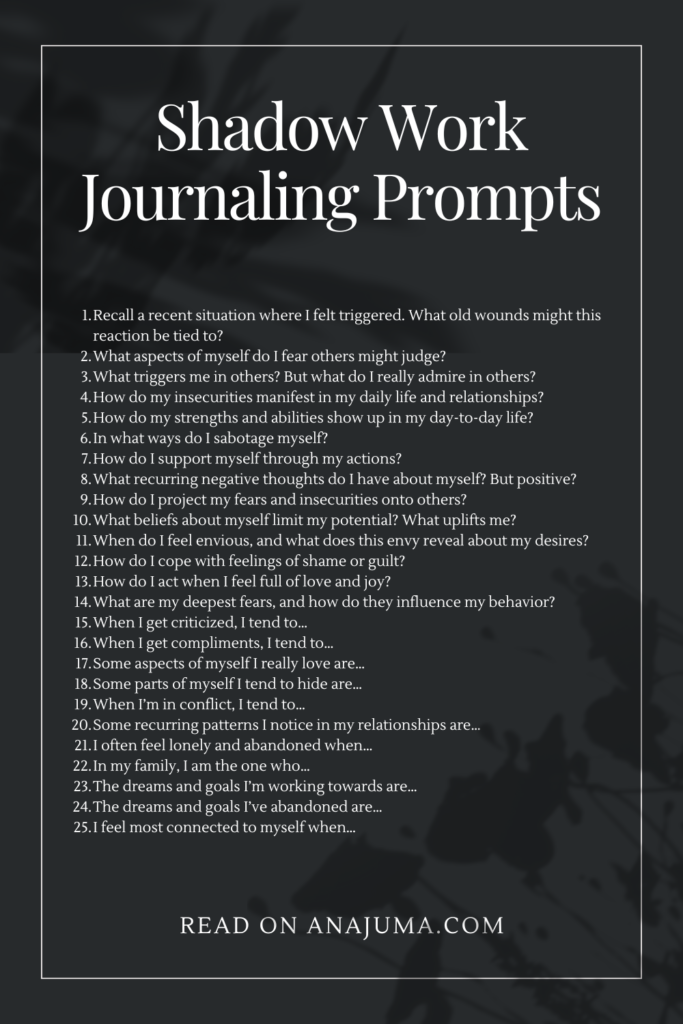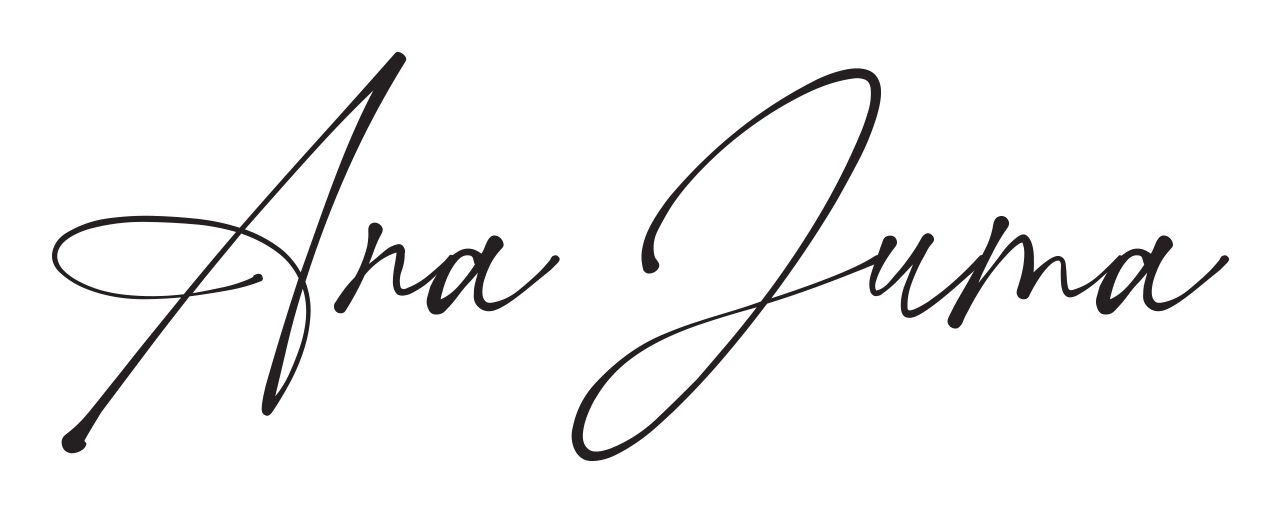Shadow Work Journaling: What It Is and How to Get Started

About Ana Juma
Keeping a diary from a young age has encouraged me to explore writing as a vehicle of self-discovery and expression. Today, I support individuals nourishing and healing their inner lives through words, so we can find meaning in experiences and co-create a kinder world.
Table of Contents
Pin for later!

Let's Connect

Shadow work journaling is a gentle yet profound practice that invites us to explore the hidden parts of ourselves — the thoughts, emotions, and behaviors we often keep tucked away in the shadows.
Imagine having a safe place where you can unveil these aspects of your psyche with compassion and kindness. Through the pages of your journal, you embark on a journey of self-discovery, shining a light on the parts of you that are eager to be seen and heard. You may be surprised to find out, through this process, that what was seemingly undesirable or difficult to see may be potentially enlightening.
In this article, we’re going to dive deeper into:
- What Is Shadow Work?
- How Does Journaling Help With Shadow Work?
- Benefits of Shadow Work Journaling
- Shadow Work Journaling Prompts
- How to Start Shadow Work Journaling
- Frequently Asked Questions
Shadow work is a tender yet empowering process, encouraging you to embrace all aspects of yourself with a curious mind. You can reconnect with those parts of you that have been split off from who you think you are — your wounds, your shame, or fear — but, as there isn’t darkness without light, you may also surprisingly encounter a deeper meaning of your beauty, excitement for life, or hidden talents.
What Is Shadow Work?
Shadow work is a transformative process of delving into the unconscious parts of ourselves — the “shadows” that encompass suppressed emotions, hidden desires, and aspects of our personality that might be hidden or difficult to see.
These elements, often formed through early life experiences and societal conditioning, can influence our thoughts and behaviors without realizing it. By consciously exploring these shadows, we bring them into the light of awareness, allowing us to understand and integrate them.
This practice not only fosters personal growth and emotional healing, but also empowers us to live more authentically and harmoniously. Through shadow work, we learn to embrace our whole selves, acknowledging that every part of us, even the hidden (and the dark) aspects, holds valuable insights and potential for transformation.
History of Shadow Work
Shadow work has its roots in the early 20th century with the pioneering work of Swiss psychiatrist Carl Jung.
Jung introduced the concept of the “shadow” as part of his analytical psychology, describing it as the unconscious aspect of the personality that contains repressed weaknesses, desires, and instincts.
He believed that confronting and integrating these shadow aspects was essential for personal growth and individuation — the process of becoming one’s true self. Jung’s ideas significantly influenced the field of psychotherapy, encouraging a deeper exploration of the unconscious mind.
Over the decades, shadow work has evolved, blending with various therapeutic practices and self-help techniques, becoming a powerful tool for emotional healing and self-awareness in both clinical settings and personal development journeys.
How Does Journaling Help With Shadow Work?
No matter what type of journal you choose to keep, it’s well-known that journaling is a powerful tool that helps you go deeper within. My mentor, Kay Adams, author of the Journal to the Self and founder of the Therapeutic Writing Institute, says that
“The journal is like the moon, emitting a magnetic tug that pulls information from the unconscious and subconscious level and brings it to the surface, to a level you can work with.”
In other words, journaling is in essence a shadow work practice that brings light to the unseen parts of you and gives you the tools to make the most out of it.
And how can you explore your “shadows” in this regard, you may ask yourself? Well, here are a few ways to do so:
1. Increasing self-awareness
Engaging in shadow work journaling significantly enhances self-awareness by encouraging you to consciously reflect and ponder upon your inner world.
You increase self-awareness by delving into your emotions, thoughts, reactions, and past experiences, bringing hidden aspects of yourself into the light. As you write, you gain insights into why you feel and behave the way you do, uncover patterns, and connect the dots between past experiences and present behaviors.
This deep, reflective process fosters a greater understanding of your true self, enabling you to recognize and integrate all parts of your identity.

2. Developing compassion and acceptance
Journaling prompts us to reflect deeply and embrace our shadows. As we go deeper, we may learn to approach all aspects of ourselves with kindness and understanding, rather than judgment.
This practice nurtures love and compassion for what we once used to reject or simply unsee, helping us embrace our whole being. Over time, this compassionate self-awareness transforms our relationship with ourselves, fostering holistic healing and integration.
3. Uncovering recurring patterns
Shadow work journaling helps us uncover and identify recurring themes and patterns in our lives. By regularly documenting our thoughts and experiences, we create a safe space to make these unconscious patterns conscious.
Recognizing these patterns empowers us to make different decisions moving forward, breaking free from cycles that no longer serve us. This heightened awareness fosters personal growth and enables us to live more intentionally, aligned with our true selves.
4. Releasing suppressed emotions
The act of putting our feelings and experiences into words helps us understand and process them, making the once-hidden parts of our psyche visible and manageable.
Through the process of journaling, we can bring to the surface memories and emotions we’ve repressed throughout our lifetime. These suppressed emotions form a substantial part of our shadow, and expressing them in writing can release pent-up tension and pain, creating a sense of liberation and emotional freedom.
Benefits of Shadow Work Journaling
As mentioned above, shadow work has been developing throughout Jung’s lifetime and further explored in the field of psychotherapy in the past century. Studies have shown its effectiveness and utility in improving mental health and overall well-being.
When it comes to shadow work journaling, here are a few compelling reasons to give it a try and experience its benefits for yourself: 🙂
1. An overall sentiment of wholesomeness and integrity
Engaging in shadow work journaling brings an overall feeling of wholesomeness and integrity. It does so by acknowledging and integrating all parts of ourselves, including the aspects we have kept hidden. Therefore, we achieve a sense of completeness and harmony.
This practice helps us align our inner and outer worlds, allowing us to live more authentically and true to ourselves. And science agrees, too. A 2013 study outlined that clients in therapy who started working on accepting their so-called problematic parts, instead of rejecting them experienced a deep transformation of themselves and their most significant relationships.
2. A deeper feeling of connection
The connection we have to ourselves is one beautiful thing, but our desire for real connections to others is a fundamental human need. As the Harvard 85-year-long study has found, the key component to long-lasting happiness is the strength of our relationships.
Therefore, shadow work journaling can foster a more authentic way of relating to the people in our lives. As we come to understand and accept our own shadows, we become more compassionate and empathetic towards others. This self-awareness allows us to engage in deeper, more meaningful relationships, as we stop projecting our unresolved issues onto those around us.
When we truly start embracing who we are as a whole, we can show up more genuinely in our interactions, creating bonds based on mutual understanding and acceptance. This authenticity will nurture more fulfilling relationships, as we stop wasting our energy trying to put up a mask of who we think we need to be to feel loved and appreciated.
3. A deeper sense of getting to know yourself
When we delve into our shadow, we access a rich reservoir of emotions, thoughts, and experiences that have been tucked away. By exploring these hidden aspects through journaling, we reconnect with what has been lost, repressed, or just ignored for a big part of our lives. Therefore, we free up mental and emotional space, going deeper on our path of self-realization.
As a result, your mind may spark new ideas, inspire artistic expression, and help you see the world from fresh perspectives. This way, you’re creating room for change and nurturing your intrinsic motivation to take action towards deep transformation from the inside out.
Shadow Work Journaling Prompts
If you’re getting started with shadow work journaling or would like to deepen your practice, here are some journaling prompts and techniques that can offer you guidance:
1. The Dialogue Technique
One simple yet powerful method to start shadow work journaling is trying out The Dialogue Technique developed by Dr. Ira Progroff.
The method involves creating written dialogues between different parts of yourself, such as your conscious self and other aspects like your inner child, inner critic, or even more abstract concepts like your dreams and fears.
The idea is to personify these elements and engage in written conversations with them, allowing for a dynamic and introspective exploration of your inner world. As you give voice to these different aspects of your psyche, you might uncover hidden thoughts or emotions, which have been repressed down into your shadow.

2. Springboards
Springboards is another journaling technique that can support your shadow work journaling practice. As the name suggests, the purpose of Springboards is to provide a “jumping off” point for your write through questions (also known as journaling prompts) or sentence stems (sentence completion).
If you’re looking for a more direct approach to diving into shadow work, here are a few prompts and questions to journal on:
- What emotions tend to be uncomfortable, and thus I usually avoid, and why?
- What emotions do I love to feel and want to nurture more?
- Recall a recent situation where I felt triggered. What old wounds might this reaction be tied to?
- What aspects of myself do I fear others might judge?
- What triggers me in others? But what do I really admire in others?
- How do my insecurities manifest in my daily life and relationships?
- How do my strengths and abilities show up in my day-to-day life?
- In what ways do I sabotage myself?
- How do I support myself through my actions?
- What recurring negative thoughts do I have about myself? But positive?
- How do I project my fears and insecurities onto others?
- What beliefs about myself limit my potential? What uplifts me?
- When do I feel most envious, and what does this envy reveal about my desires?
- What are my biggest regrets, and how have they shaped me?
- Which moments in my life helped me grow that I’m really grateful for?
- How do I cope with feelings of shame or guilt?
- How do I act when I feel full of love and joy?
- What are my deepest fears, and how do they influence my behavior?
- When I get criticized, I tend to…
- When I get compliments, I tend to…
- Some aspects of myself I really love are…
- Some parts of myself I tend to hide are…
- When I’m in conflict, I tend to…
- I usually take care of my needs through…
- I don’t take care of my needs when…
- The things I avoid thinking about or doing are…
- When I feel inadequate, I tend to…
- Some recurring patterns I notice in my relationships are…
- I resist change when…
- I often feel lonely and abandoned when…
- In my family, I am the one who…
- The dreams and goals I’m working towards are…
- The dreams and goals I’ve abandoned are…
- I feel most connected to myself when…
- I feel most disconnected from myself when…
And if you need even more inspiration, you can check out the article I wrote with Mindvalley on this topic: 75 Shadow Work Prompts.
How to Start Shadow Work Journaling
As with everything else, the first step may be the most difficult. So here’s how to start on your shadow work journaling path:
1. Set the intention
Begin by setting a clear intention for your shadow work journaling. How can this practice contribute to a better self and a more fulfilling life? In what ways do you wish to get to know yourself better? What parts of you need more love? Let yourself approach this practice with compassion and curiosity.
If you’re getting a dedicated journal for your shadow work journaling, I’d recommend writing on the first or second page a reminder of why this is important to you.
2. Create your safe space
Find a quiet, comfortable place where you won’t be disturbed. It should feel safe and inviting, inspiring you to go deeper into reflection. Also, notice what time of the day would nurture the connection you want to create with yourself. Is it the slow morning time when the rest of the world is asleep? Or do you feel more reflective at night when you’re done with all the tasks of the day?
Choosing a dedicated time that you associate with shadow work journaling may aid in habit formation. Thus, it keeps you accountable and looking forward to your time of reflection.
3. Gather your materials
Besides having a dedicated journal and a pen ready to inspire your writing, you might also want to keep some comforting items nearby, such as a favorite blanket, a cup of tea, or a natural candle to create a nurturing environment.
A common fear we all have about journaling is the sad possibility of having it read by someone else. If you don’t feel safe enough to keep your journal protected, write your entries on a digital device where the chances of your content remaining private are higher.

4. Set a time and write freely
For your beginning practice, you may choose a set amount of time to write if it helps you let go of pressure. You can choose any period of time you feel comfortable with, even if it’s just 10-15 minutes.
Remember that the purpose is to allow yourself to write freely and without judgment. Let your thoughts and feelings flow onto the pages, exploring the prompts deeply, wholly, and honestly. And maybe some journaling music might be soothing to your practice!
5. Reflect and integrate
After writing, you can take some time to reflect on what you’ve uncovered. This reflection might take place right after writing or a few days apart. Consider how these insights might relate to your current behaviors and experiences.
Think about how you can integrate this new understanding into your daily life. And if you think it fits, you may discuss your journal entries with your therapist or mental health professional.
Some prompts that might help are:
- As I read this, I am surprised by…
- As I read this, I notice…
- As I read this, I realize…
And sometimes, the intelligence of our bodies may speak louder than our rational thoughts. So don’t forget to listen to your body and ask it:
- Where in my body do I feel any sensation as I read about this experience/ these thoughts, or these emotions?
- How does my body remember this experience?
6. Be consistent
Consistency is always key, so don’t be afraid to make shadow work journaling a regular practice. Consistency helps deepen your self-awareness and promotes ongoing personal growth.
However, one important thing to mention is that consistency doesn’t have to mean daily. It can be weekly, twice a week, or once a month. The essential part is to find your own cadence. Moreover, as you deepen your practice, you’ll shed deeper layers of your shadow, which leads to a more profound transformation over time.
Frequently Asked Questions
Any new step on our personal exploration journey can feel daunting and overwhelming. For this reason, here are some of the most frequently asked questions I often receive about shadow work journaling:
1. Where do I start?
Many people wonder, “Where do I start?” The answer is to begin with simple, open-ended prompts that invite self-reflection. For example, you might explore what emotions you tend to avoid and why. Starting with prompts that resonate with you helps ease into the practice and makes the process feel more approachable and less overwhelming. We don’t need to overcomplicate things in order to make them effective.
You can also find guided journals available online. One great example is The Shadow Work Journal.
2. Is it normal to feel uncomfortable?
Yes, it’s perfectly normal, but not necessarily common. Shadow work can stir up deep emotions, but it’s important to approach them with compassion and patience. Feeling discomfort is a natural part of the journey, indicating that you are touching on meaningful aspects of your inner self that need attention and healing.
However, shadow work doesn’t have to be heavy and uncomfortable, but rather can be approached with curiosity and excitement. It’s all about how you frame it. 🙂
3. How often should I journal?
Consistency is helpful, but it’s important to go at your own pace. You might choose to journal daily, weekly, or whenever you feel called to write. The key is to make it a regular practice that fits into your life without adding stress. Listen to your intuition and let it guide your journaling frequency.
4. What if I uncover something painful?
Remember, the goal of shadow work is self-awareness. It’s okay to take a break if it gets overwhelming and seek support from a friend or therapist. Remember to always be gentle with yourself.
Uncovering painful memories or emotions can be challenging, but it also provides an opportunity for deep healing and personal growth. Approach these moments with as much kindness and understanding towards yourself as you can.
There’s also the likelihood of uncovering something beautiful. Are you ready to shine bright and unapologetically?
Embrace the Journey
The mere act of embarking on this journey is a brave and transformative step forward. As you delve into the depths of your psyche, you invite hidden parts of yourself into the light, that might potentially transform your life for the better (or for the best). 🙂
Imagine the liberation of breaking free from old patterns and stepping into a life aligned with your true essence. Fortunately, you have the opportunity to weave together the fragmented pieces of your identity, cultivating a sense of wholeness and integrity.
And if you need a little bit of guidance as you write, reflect, and grow, I’ve created a 7-day beginner’s guide to journaling to support you along the way. All you have to do is leave your email below and let your curiosity lead the way on this exciting path of self-discovery.
7-Day Free Journaling Journey
Keeping a journal for personal growth is one of the most powerful, yet simple (and affordable) rituals you can cultivate. Join me to receive daily emails for a week to help you start writing a journal today.

Hello, I'm Juma
Keeping a diary from a young age has encouraged me to explore writing as a vehicle of self-discovery and expression. Today, I support individuals nourishing and healing their inner lives through words, so we can find meaning in experiences and co-create a kinder world.
Pin for later!

